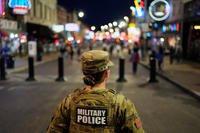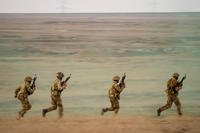Civilian federal employees, contractors and family members identified as having "Havana Syndrome" -- mysterious symptoms that began, for many, overseas after hearing a loud noise, accompanied by instantaneous earaches and headaches -- face difficulties receiving medical care in the military health system as allowed by law.
For a report published Monday, Government Accountability Office analysts interviewed 65 of the 334 people who qualify for Defense Department medical care for their condition, referred to as "anomalous health incidents" by the U.S. government, and found they've faced troubles navigating the system, scheduling appointments, and receiving medical hardware, medications and support.
According to the Government Accountability Office, the affected CIA, State Department and FBI employees and others have not received clear guidance from the DoD about their medical care and often rely on one another to navigate the maze of facilities, including the National Intrepid Center of Excellence for traumatic brain injury in Bethesda, Maryland; Walter Reed National Military Medical Clinic; and regular military hospitals and other facilities.
Many of those interviewed for the GAO review said they had little support and faced difficulties getting appointments at military hospitals as they qualify for care only on a space-available basis. They added they couldn't reach anyone to make appointments at the National Intrepid Center of Excellence.
"Some patients stated they had waited so long for a response from the [National Intrepid Center of Excellence] that they had essentially given up on the military health system and were pursuing treatment in the civilian sector," GAO analysts wrote in "Havana Syndrome: Better Patient Communication and Monitoring of Key DoD Tasks Needed to Better Ensure Timely Treatment."
Several State Department employees at the U.S. Embassy in Havana, Cuba, began suffering in 2016 from headaches, tinnitus, hearing loss, vertigo and cognitive dysfunction after hearing a loud noise that came from one direction, according to sufferers.
Reports from other U.S. government employees, contractors and family members followed after similar incidents and experiences in China, Russia, Poland, Colombia and elsewhere overseas, as well as in the U.S., including Washington, D.C.
Studies into the possible causes have reached differing conclusions. In a report declassified in February 2022, a panel of intelligence community experts said that pulsed radiofrequency energy could be responsible for symptoms, while an Intelligence Community Assessment published in March 2023 found that most federal agency members believed it was unlikely the incidents were targeted energy attacks by a foreign adversary. That report concluded the symptoms likely were the result of a conventional illness or preexisting condition.
In 2022 and 2023, Congress passed two laws that required the DoD to furnish medical treatment to affected employees and family members at locations that included the National Intrepid Center of Excellence and certain military treatment facilities.
According to the report, 34% of those eligible for health care were either CIA or worked in the Office of the Director of National Intelligence; 29% were with the Defense Department; 16% were State Department; and 11% were FBI employees. The remainder were classified as "other" and included some 15 children.
Those who received care through the U.S. military -- 50 patients -- and were interviewed by GAO told officials that they were grateful for the treatment from providers familiar with their experiences. Nearly half said their symptoms had improved as a result of treatment.
But many said they never received guidance on how to access care and faced challenges getting onto base, receiving medications and making timely appointments.
By law, the DoD also was to maintain a registry of affected patients, collect data and information that would be used to help drive treatments, and establish processes for caring for patients through a network of specialty facilities, the Intrepid Spirit Centers, at U.S. military bases across the country.
But those tasks have not been completed, according to the GAO.
"DoD has created a plan to address some access concerns of [anomalous health incident] patients, but it contains uncertain time frames and lacks monitoring provisions," the report states.
The GAO noted that, because its analysts interviewed only volunteers from the patient community, the findings may not represent the experiences of all those affected.
The watchdog recommended that the DoD provide written guidance such as a handbook, as a way to educate patients on their care; develop a small cadre of health providers and administrators to manage cases and care for patients; and work to fill provider vacancies by shortening the length of time it takes to onboard new employees such as nurse navigators.
The Defense Department agreed with the recommendations, with Seileen Mullen, principal deputy assistant secretary of defense for health affairs, writing in a response to the report that the DoD is piloting a handbook to guide patients and will finalize it by early fiscal 2025. She said it also is developing monitoring capabilities and maintains a "coordination cell" at the National Intrepid Center for this group of patients.
According to the report, the patients feel stigmatized by their conditions, and many are reluctant to seek care, given the reaction they have received at work after disclosing that they were affected. Nearly half the patients GAO analysts interviewed said they faced difficulties at work -- losing assignments, being placed on leave, having their security clearance renewals delayed, or being referred for psychological care.
Several patients said they did not tell their supervisors of their exposure out of concern that it would negatively affect their careers.
Studies published in March by the National Institutes of Health found that affected patients had no evidence of brain injury. Using magnetic resonance imaging and blood biomarkers for brain injury, researchers examined more than 80 patients with Havana Syndrome and compared them with a control group, finding "no significant differences."
In an accompanying editorial, Dr. David Relman, a professor at Stanford University School of Medicine who also has engaged in research on anomalous health incidents, said that drawing conclusions from this study that "nothing happened" would be "ill-advised."
Noting conditions such as Gulf War Illness, chronic fatigue syndrome and long COVID-19 that initially were viewed with skepticism and suspected to be psychological, not physiological, Relman said institutions must examine their own biases, address shortcomings in research and treat patients.
"Prejudice and poorly supported assumptions must be set aside. Clear and timely public communication is essential. The delivery of appropriate nonjudgmental care must be initiated without delay," Relman wrote.
Related: New Study Finds No Brain Injuries Among 'Havana Syndrome' Patients















